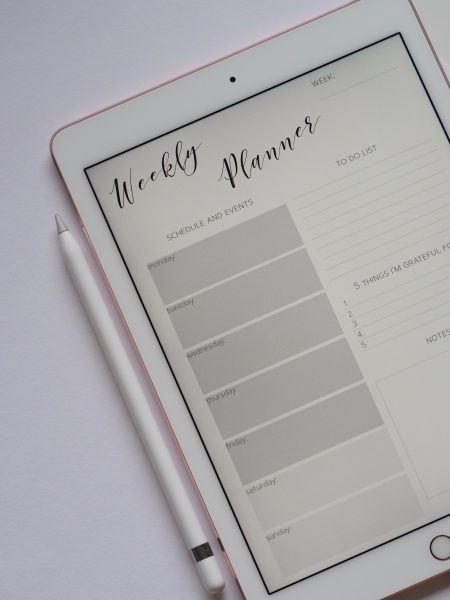Finding Time For Fitness – Then Managing It Like A Boss!
Life can get hectic and finding time for fitness can be difficult!
But did you know that you only need thirty minutes daily to become stronger and fitter? Even though it doesn’t seem like a lot of time, many people struggle to find it.
From busy stay at home mums with plenty of chores to business executives with daily to-do lists that reduce their free time to barely anything.
It takes focus and practice to balance your daily activities in order to achieve your goals. You’re most likely an experienced manager, you only need to learn how to manage your time better.
Reading this blog will help to hone your time management skills. With practice, you should find it possible to dedicate some time each day to your fitness goals.
Using Planners, Diaries Or Organisers

Using planners and organisers are helpful if you’re a busy person and they’re excellent tools for finding time for fitness. Or even if you need some ‘you’ time, planning your months, weeks and days are important.
Many social events or appointments are unlikely to change. Using a planner gives you a clear view of what’s approaching, so can focus on your personal and fitness goals.
This, in turn, allows you to bend your exercising schedule or prepare healthy meals in advance. It also frees your memory so you don’t need to worry about forgetting something important.
There are many smart ways to keep your events, tasks and activities in order.
The first is a calendar. Unless you need to write down a lot, choose the one which displays one week on a page. This layout will allow you to see all the events and tasks you have planned for the week.
Or you could keep track of all important events by putting them on a big wall calendar. This monthly view allows for scheduled appointments, birthdays and holidays.
Use your personal calendar to note your milestones and checkpoints. Mark the days on which you exercise.
To-do Lists And Notebooks
Create to-do lists, write down important events and meetings. Use plenty of colourful highlighters and pens to stimulate your memory.
To-do lists are helpful in finding time for fitness and managing everyday chores and obligations. They are an awesome way to systemise your goals and break them down into daily tasks.
It’s always good to think backwards. That’s how you create a comprehensive, doable list of steps to follow.
As the day passes, go back to your to-do list. Check off those completed tasks to see what else you still have to do.
You can also get a notebook which you can turn into your personal dieting and exercising diary. Day by day, describe your meals and exercise sessions.

Be honest with yourself. Write down when you skipped training or had a dietary cheat day. Putting this information on paper evaluates your efforts better.
If you’re not a big fan of writing or carrying notebooks, find a suitable app to replace it. Don’t be afraid to experiment, that’s how you learn what works best for you.
Eisenhower Matrix And Your Priorities
A very common approach to task management is to put them on a to-do list and then complete them one by one. Finding time for fitness should be so easy by adopting this proven technique!
Ticking every item off is a rewarding thing to do. Everybody likes to see what they’ve accomplished for the day.
The problem is that this approach isn’t exactly the best one. Of course, it is a good start. But to free some time up for yourself, you need something more effective.
Try not to think that every task on their to-do list is as important as the next. Instead, try to prioritise in order of importance AND urgency.
This is when the Eisenhower matrix kicks in. Imagine four squares of different categories:
- Important and Urgent (Do it as soon as possible)
- Not Important but Urgent (Who can do it for me)
- Important but Not Urgent (Schedule time to do it)
- Not Urgent and Not Important (If I can get to it)

Try to understand the subtle difference between ‘Urgent’ and ‘Important’. This will help you to plan and prioritise your daily tasks.
‘Important’ tasks are those which contribute to your final goal. If your goal is to lose weight, your important tasks are to exercise and adopt a healthy nutrition plan.
‘Urgent’ tasks are those with a sense of urgency or an approaching deadline. They occur usually because you have neglected something or someone else needs it now.
For example, you have let a ‘not urgent and not important’ task slip for too long and it has reached its deadline. Or your boss has delegated a task to you which requires your immediate attention.
As hard as it may be, try to keep urgent tasks from winding up on your daily to-do lists. This way, you give priority to your important tasks.
Eisenhower Matrix Examples
When you prepare your daily to-do list, think about which category is relevant to the task.
‘Important and Urgent’ tasks take first priority. In this category you might list:
- Making last minute meal preparations before work
- Completing urgent tasks from the previous day
- Solving unexpected problems
‘Not Important but Urgent’ objectives take priority after the ‘Important and Urgent’ tasks. If it’s possible, delegate these tasks to someone else. You might include the following in this category:
- Return a phone call to parents about baby-sitting times
- Washing your activewear if you’re all out
- Cleaning up the mess before dropping the kids at school (and get them to help)
Plan and schedule time to complete your ‘Important but Not Urgent’. Include such tasks as:
- Workout for 30 minutes after work
- Pay gym membership fee which is due today
- Make next week’s healthy meal plan & shopping list
‘Not Important and Not Urgent’ tasks take the lowest priority.
Get to them only if you have completed everything else on your prioritised to-do list. You would include things like:
- Catching up on gossip and social media
- Shopping online for personal items
- Answering or returning unimportant phone calls and emails
Eisenhower matrix may at first seem like some needless fuss. But, when you get the hang of prioritising your tasks, you will notice yourself achieving far more each day.
This boost in productivity should free up extra time. Why not spend that extra time on yourself – something that’s important to you? Like finding time for fitness and making measurable progress towards your fitness goals!
[cta id=”1909″ vid=”0″]
Finding Time For Fitness With Time-boxing
The time-boxing technique stresses not the task itself, but the time you spend on it.
It stems from the Italian word ‘Pomodoro’. A kitchen timer which, back in the day, often took a form of a tomato (pomodoro).
The technique’s creator, Francesco Cirillo, used the timer to assign a period of time to some tasks.
If you want to try time-boxing, set the timer for 25 minutes and focus on whatever you’re working on.
Your SMART fitness goals should be ‘time-bound’, as should your tasks. Do as much as you can in a set amount of time, then take a short break and revise your results.
Delegating
If you’re a busy person, you may find that you frequently take on extra tasks. It’s no wonder finding time for fitness is difficult if you have to do everything.
Instead, you should do exactly the opposite to free up some ‘you’ time. The key to finding a moment for yourself or scratch certain tasks from your list is delegating tasks to someone else.
It may seem daunting at first because you like things done a particular way, but you’ll soon get used to it.
When you’re super busy and feeling overwhelmed, you should always ask for help or delegate.
Don’t resent people if they don’t offer that help on their own. They may think you’re ok handling everything yourself.
Take household duties for a classic example, to whoever is first through the door after work.
If the house is messy, there’s washing on the line and dinner to prepare, don’t feel obliged to do it all yourself.
Families make a great team, so get everyone involved in the dirty work. It’s everybody’s house, so why not share the workload?
Delegate the following household tasks and see how much time you can save when everyone:
- puts their dirty dishes in the dishwasher
- makes their own beds
- helps with the laundry
- cleans the bathroom after use
- puts every item back in its place after use
You could even make a to-do list to clip to the fridge and delegate the tasks which they can take care of.
It starts simple but delegating can create a huge amount of extra time. You’ll you feel relieved eliminating that task from your to-do list.

Time Stealers
You might be oblivious to how much time you’re wasting on little, meaningless things. Or unaware of how many things get in your way, even though they shouldn’t.
Eliminating time stealers improves your time management skills and frees up time. More than thirty minutes daily which is enough time to focus on your fitness goals.
Time stealer #1: Media
Social media, TV, internet or phone can soak up a lot of your attention when you’re not even aware of it.
How many times have you scrolled Facebook to see what’s up, and lost half an hour browsing your feed?
How many unwanted calls do you receive but you’re too polite to say “sorry, I’m busy, I’ll call you back later”?
Or…how many times have you sat to take a little break and turned on the TV for a sneaky Netflix episode?
A great way to prevent media from stealing time from you is to schedule time for it. Add it to your diary or to-do list, get your fix, check it off the list and move on.
Time stealer #2: Friends, Family and other people
Even though they don’t intend to, other people often get in the way. Friends and family calling to catch up or uninvited guests can drain more time than you expect.
It’s ok to refuse and schedule time for a catch up instead. Prioritising tasks that are important to you is neither selfish nor rude.
Time stealer #3: Inadequate Knowledge or Communication
It’s no mystery that if you don’t know how to do something, you take longer to do it.
Sometimes you waste an awful amount of time trying to do something you’ve got no idea about.
It would take less time to watch an instructional video or ask someone’s help before completing it.
Make sure you communicate well with others. Misunderstandings can waste a lot of your time if you’re not clear of the task at hand.
Time stealer #4: Doing Everything Yourself
You already know that delegating tasks can save you a lot of time. You don’t have to do everything yourself.
If you don’t know how to deal with something, ask somebody who does.
If you’re hurt, overwhelmed, exhausted – ask someone to assist you. Make a habit of delegating tasks to other people.
Time stealer #5: Personal Disorganisation
It’s obvious chaos is counterproductive!
Good planning and prioritising will aid your time management skills. Learning these skills help you to finish your tasks earlier.
It’s mandatory that your objectives are clear and understandable. Use Eisenhower’s matrix, calendars and planners.
If you know what you want to achieve and how you’re halfway there. Don’t let personal disorganisation ruin your plans.
Be direct about your goals and tasks and make it happen.

Time stealer #6: Procrastination and Indecision
Sometimes the hardest thing to do is to actually do what you have planned. You know you have to do it, but it’s a nuisance!
You try to distract yourself from the task at hand and find something more interesting. Like picking up the phone to check Instagram?!
The best way to overcome procrastination is to force yourself to start the task. Shut down your TV, PC log out of social media and turn off your mobile.
If you’re serious about finding some time for fitness, get started and it will snowball from there.
Time stealer #7: Other Factors
The worst time stealer is the one you have no control over – like when a family member is sick or injured.
You spend time taking care of them rather than proceeding with your plans. It does happen and you need to take it into account.
Sometimes you may not be well yourself or exhausted from lack of sleep. But life does have its challenges, so stress and anxiety isn’t anything abnormal.
When situations like these arise, don’t worry if you skip a workout or don’t eat as healthy as you planned. You’re only human!
The point is not to let these days last too long by focusing on getting better. As soon as you can, try to get back into your routine.
Of course, you can always delegate tasks or ask for help. Focus on those important tasks when you’re better.
Conclusion
Nobody is born with perfect time management skills. But you can learn how to do it the right way.
By adding some of these valuable time management techniques to your life, finding time for fitness should be a walk in the park (love the pun!)
And why not use these time management methods at work too? All that extra time to use productively might get you a promotion!
Don’t be discouraged if things don’t work out at first, mastering this difficult art doesn’t happen overnight!
But keep at it, and you should soon have more time to reach those fitness goals.
How to find time for fitness and manage it?
- Use diaries, planners, organisers, notebooks or to-do lists
- Determine your priorities using the Eisenhower Matrix
Important and Urgent (Do it as soon as possible)
Not Important but Urgent (Who can do it for me)
Important but Not Urgent (Schedule time to do it)
Not Urgent and Not Important (If I can get to it) - Find time for fitness using the time-boxing method
- Delegate tasks to create time for yourself
- Eliminate time-stealers
